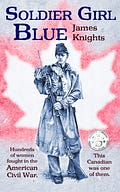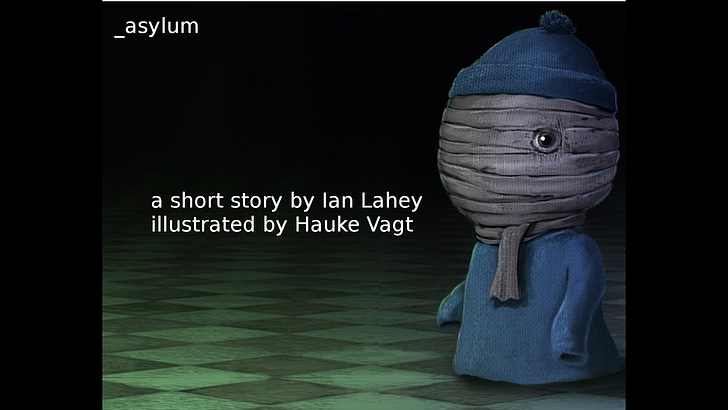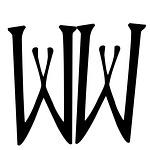This issue of the newsletter packs a double whammy! We have James Knights, the author of Soldier Girl Blue, with us. This is what he has to say about his historical fiction set in the American Civil War.
Though Soldier Girl Blue is fictional, I was inspired to write it after reading the wartime memoir of Sarah Emma Edmonds of Magaguadavic, New Brunswick—a daring and courageous woman whose contributions to American freedom are largely unknown to the general public.
When she wrote her memoir, Nurse and Spy in the Union Army, the proceeds of which she donated to aid sick and disabled veterans, she gave no hint that she had masqueraded as a man. However, when the malaria she contracted during her service recurred, disabling her, she had no choice but to apply for a pension and admit her “duplicity,” as she put it. After written testaments from her fellow veterans, a special act of congress awarded Edmonds a monthly pension of $12, about $300 today.
Possessing both an abiding interest in the Civil War and my Canadian ancestors, I became interested in Edmonds’ story when I learned of two historical facts little known outside of academia, namely, that approximately 550 women fought on both sides of the Civil War disguised as men and between 33,000 and 55,000 Canadians (those from Ontario and Quebec) and Maritimers (those from New Brunswick, Prince Edward Island, and Nova Scotia) fought in the conflict.
Edmonds did both. This book honors Edmonds and those like her: women who picked up arms and Canadians and Maritimers of then-British North America who fought in America’s Civil War.
At the age of 17, Edmonds left her home to escape an arranged marriage forced on her by her misogynistic and abusive father. Travel for a lone young woman being unsafe, she disguised herself as a man, eventually making her way to the United States. There she found herself in a country on the verge of civil war. She refused to claim neutrality as a foreigner, instead choosing to join the fight to end slavery.
Like Edmonds, a good many Canadians and Maritimers had already immigrated to the United States before the war and enlisted for noble reasons. Others came south merely looking for work or were galvanized by a desire for excitement. Unscrupulous American recruiting agents operating in the British provinces duped some. A great many Canadians and Maritimers, however, joined the fight motivated by a desire to do the good and moral thing. Edmonds herself wrote, “I thank God that I am permitted in this hour of my adopted country’s need to express the tithe of the gratitude which I feel toward the people of the Northern States.”
In order to do what her conscience demanded, Edmonds had to conceal who she really was. Working in Flint, Michigan, disguised as a man named Frank Thompson when the war broke out, Edmonds successfully enlisted as a private on May 25th, 1861, in Company F, 2nd Michigan Infantry as an army field nurse, which today would be a combat medic (The 2nd Michigan has a cameo appearance in Chapter 30). In anticipation of your question, no, at the time Army medical exams were cursory at best. As long as a recruit had two good front teeth to tear open paper cartridges, a trigger finger, and could see and hear, further inquiries seemed pointless to harried Army medical officers.
While I wanted to ensure the story was a tribute to Edmonds’ heroism, I restricted the story to the Peninsula Campaign, though she fought in several other campaigns, including Antietam (September 17, 1862), Fredericksburg (December 11 - 15, 1862), and Vicksburg (May 18 - July 4, 1863). Had I not done so, I would have ended up writing a series, which I’ve done before and was not eager to do again.
Writing the first draft, including doing a considerable amount of research, took about two years. Editing and revising took another few months.
I’ve been asked if I finished my research before beginning to write, or was it a simultaneous process. Since I was already fairly well versed in Civil War history before I began the project, I began fleshing out the story as soon as I had worked up the initiative. However, as I moved through the adventures of Emily Edmunds, aka Edmund Fredericton (Fredericton is the capital of New Brunswick), I found I needed to delve deeper into various aspects of the war. I have listed my main research sources at the end of this piece.
Far from presenting a glorified image of war, as many novels do, I wanted to present an accurate picture. I spent 13 years in the US military and was deployed to Iraq as an FBI Special Agent in 2007, so I think I’m well-positioned to write a depiction of the realities of war. I think I succeeded.
Lastly, in addition to wanting to honor Edmunds and those like her, I wanted to inform and educate: I’ve found most people who are Civil War enthusiasts have never heard of Edmunds or the other women who fought in the war on both sides. This includes Canadians who are unaware of the diminutive native of Magaguadavic, New Brunswick, who represented her nation so honorably.
If you find the subject interesting, here are some of the books that I used as reference and found particularly useful.
Nurse and Spy in the Union Army (memoir of Sara Emma Edmunds): https://amzn.to/3D5gdLb The book is also available digitally at no charge from Guttenberg.org: https://www.gutenberg.org/ebooks/38497
They Fought Like Demons, DeAnne Blanton and Lauren M. Cook: https://amzn.to/3uwuH3Q
Blood and Daring: How Canada Fought the American Civil War, John Boyko: https://amzn.to/3ux5mqv
She Rode With the Generals, Sylvia Dannett: https://amzn.to/3D4XaRd
Learning from the Wounded: The Civil War and the Rise of American Medical Science, Shauna Devine: https://amzn.to/3osAwOA











James Knights, Author